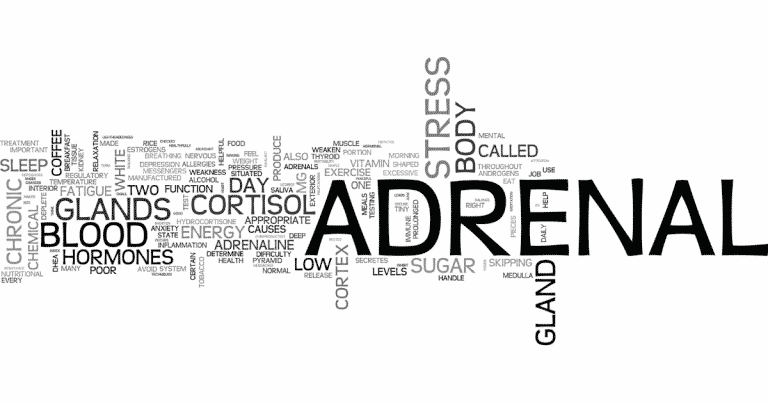In order to learn how to fix adrenal fatigue, you need to know what it is and what adrenal fatigue symptoms are. A good starting point is defining the condition, because you may not know what it is. Adrenal fatigue also known as hypoadrenia identifies that your body’s adrenal glands are tired and unable to produce sufficient amounts of hormones. Read on to learn how to avoid adrenal burnout.
What Is Adrenal Fatigue?
Located just above your kidneys, your adrenal glands are responsible for critical functions in your body. They produce various hormones which are responsible for different bodily functions, including:
- Balancing blood sugar
- Overseeing immune functions
- Managing your fight or flight response.
In particular, the adrenal glands produce a hormone called cortisol, that is responsible for helping the body deal with stress.
When the adrenals are overwhelmed, it can cause chronic fatigue, blood sugar instability, a reduced ability to deal with stress, lowered immunity, and intense cravings for sugar and caffeine. When the body is under continued and extreme stress, the levels of cortisol rise too high. Your adrenal glands are then too taxed to continue to produce enough cortisol. This results in adrenal fatigue, which can fall into these three stages:
- Stage 1 Adrenal Fatigue: Stimulation – Your body responds to a stress event by producing more epinephrine, adrenaline and cortisol. You’re likely to not be very hungry. You can’t sleep well. Your mind is racing and your body is tense. You might feel excited or anxious.
- Stage 2 Adrenal Fatigue: Depletion – People will have periods of higher anxiety alternating with periods of fatigue. Energy levels and moods will be very inconsistent so cravings for caffeine and sugar will be intense.
- Stage 3 Adrenal Fatigue: Burnout – Stage 3 is when the adrenals are out of fuel. Adrenaline, Cortisol, and DHEA levels will all be low. Most people in this stage will feel fatigued most of the day and will have a generally flat affect. Everything feels hard. Coffee and sugar may still produce a little energy, but not as much as they once did.
What Causes Adrenal Fatigue?
Think of your adrenals as your body’s stress command central. Any one of these major life events can send your body into a long-term stress battle:
- Problems in the workplace like a demanding boss, long work hours, or even uncooperative colleagues
- Financial difficulties
- Exposure to pollution
- Problematic family situations
- Inadequate sleep
- Overeating
- Substance abuse
- Infections
- Long illnesses
- Major surgery
Adrenal Fatigue Symptoms
What’s the difference between normal life stresses and adrenal fatigue? Here are seven warning signs:
- You’re tired even without having indulged in vigorous activities.
- You sleep 7-8 hours a night, but you wake up exhausted.
- You feel exhausted and weighed down by your responsibilities.
- Recovery from an illness or a stressful situation takes longer than it should.
- You’re snacking on something sweet or salty without being really hungry.
- You seem to “wake up” after 6:00 pm and feel like the day has just begun.
- You can’t seem to digest certain foods although you have never had food allergies before.
The Addiction – Adrenal Fatigue Cycle
According to adrenal fatigue experts, this condition often precedes substance abuse, creating the right physiological conditions that addiction can thrive in—whether that is food, alcohol, drugs, or nicotine. These conditions exacerbate cravings which can cause the adrenal glands to become fatigued by the overuse of these substances.
Using sugar and caffeine to cope with adrenal fatigue is a recipe for disaster. I know all too well how these cravings are overwhelming but I also know that using those substances will only further stress my adrenals, cause spikes and crashes to my blood sugar, leaving me more tired than before—not to mention irritable, unable to think straight, mood swings, and feeling shaky.
How To Cope With Adrenal Fatigue
While adrenal fatigue, particularly stage 3, can be debilitating, it is treatable. Because I’m a writer with an inquisitive brain, I set out to learn as much as I could. I also wanted to heal myself as naturally as possible. Lucky for me, I live in the mecca of alternative and natural healing medicine, Portland.
The best way to help your adrenals recover is through diet and lifestyle changes. Primarily:
- Ditch caffeine (tea, coffee, and other highly caffeinated fizzy drinks). Switch to herbal teas, naturally flavored water. If you have to keep coffee, make sure it is properly decaffeinated. Some decaffeinated coffee, unless cold-filtered, contains chemicals used to extract the caffeine and still has trace amounts of caffeine.
- Reduce salt and cut out sugar.
- Make sure you drink enough water throughout the day.
- Eat a well-balanced diet that contains fresh whole foods, and restricts processed foods that are high in salt and sugar.
- Try taking an adaptogenic herb which can help combat stress in the body and support your adrenals. I have included medicinal mushrooms, ashwagandha and maca into my diet and I take an adrenal supplement, Adaptocrine.
- Reduce stress levels: take regular breaks from work, turn off electronic devices a couple of hours before bedtime, take baths, try restorative yoga, meditate, go to therapy, and attend your regular support groups.
- Slow down. That means not taking on more than you can handle, reducing commitments on your time, limiting contact with friends who have a lot of drama, and making sure you have lots of rest—including 8-10 hours sleep a night.
Adrenal fatigue should be diagnosed by a doctor, especially as fatigue can be a symptom of other underlying illnesses, infections, or psychological disorders. Visit Recovery Guidance to find help near you.





















